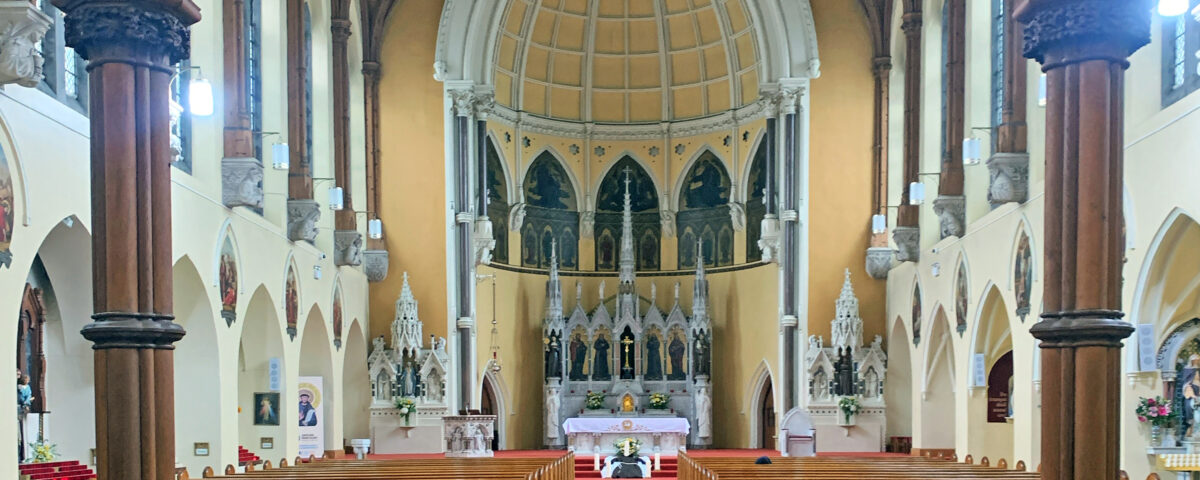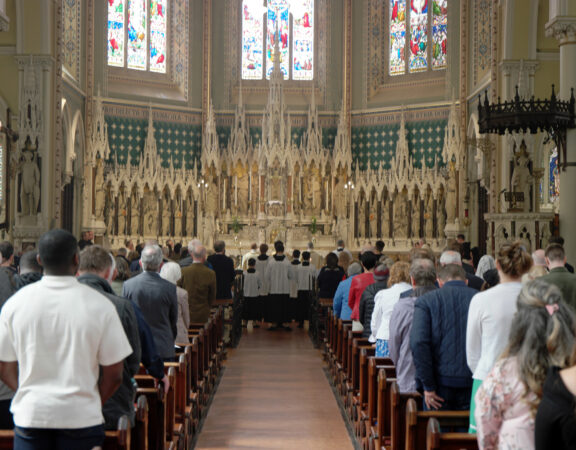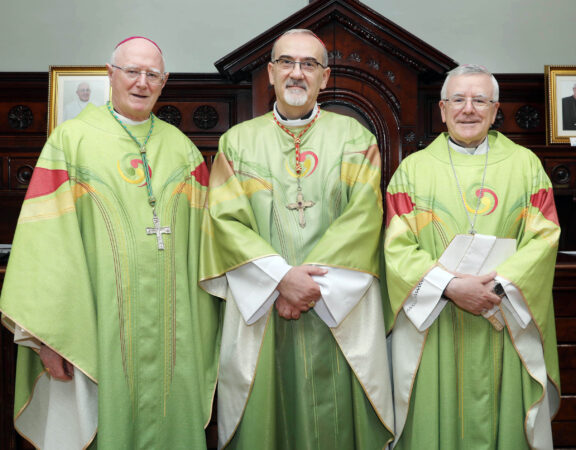Homily of Archbishop Dermot Farrell
at the diaconal ordination of Brother Antony Kurian OFM Cap
Capuchin Friary, Church Street, Dublin 7
Sunday, January 28, 2024
Diaconate—Call to Prophetic Service
It is a great joy for me to be with you today to ordain Brother Antony Kurian to the Diaconate. Today is a day of hope. Any day when we make a profound commitment is a day born of hope, a day rooted in hope: be that a solemn profession, or a marriage, or an ordination: it is a day of witness to hope, a day when hope is embodied.
Hope—the Foundation of Faith
Such a day—and Antony’s ordination to the diaconate is one such day—is ultimately not an end point, but in reality, a new beginning. Hope is an expectation of something positive in the future, while also living in the today’s world with all its opportunities and challenges. In the context of the trust in God that we call faith, and, particularly in faith shaped by the radical poverty of Christ, the true character of hope—its foundational character—begins to be perceived. Without hope, faith unravels, it loses direction and loses courage. Even more: without hope, life-giving faith dies. On the other hand, without the knowledge of Christ and without the horizon of our Father, hope is in constant danger of being reduced to a utopia, an idea ungrounded in the reality of the life that God creates for us, and constantly renews in the Holy Spirit. Is this not the two-edged reality of which the Letter to the Hebrews speaks when it says that “faith is the substance of things hoped for, the evidence of things not seen” (11:1)?
Seeking Fruitfulness, not Success
As you know, your charisms of prayer, hospitality and outreach to all, your “living the gospel” in your service to the poor and those on society’s margins, can only bear fruit in such a setting. All else is vanity and illusion. Henri Nouwen put it well, “As long as the help we offer to others is motivated primarily by the changes we may accomplish, our service cannot last. When results do not appear, when success is absent, when we are no longer liked or praised for what we do, we lose strength and motivation to continue.” (McNeill, Morrison, and Nouwen, Compassion: A Reflection on the Christian Life [London: DLT, 1982], 31) Part—not all by any means, but certainly part—of the difficulty of the Church today is the confusion of success and fruitfulness! Our world is enthralled by success, but God is committed to fruitfulness. Jesus did not say, “By their successes, you shall know them!” No, Christ’s word is, “By their fruits you will know them.” (Matt 7:20) The cross is not a success! The cross is fruitful. We see this in Jesus, and in all the great saints—known and unknown—who follow him. As Capuchins, is this not constantly before you in the life and witness of St Francis?
In today’s Gospel, St Mark puts before us a very powerful Jesus: a Jesus who teaches with authority—with exousia, or power (1:22). In that same power, he commands the unclean spirits and they obey him (1:27). However, this is the beginning of Mark’s story. As Mark’s narrative progresses, Jesus becomes less powerful: in the earlier scenes in the Gospel, the power of God in Jesus cures the sick, drives out spirits and demons, stills storms, feeds the multitudes, and raises the dead. But as Jesus’ ministry progresses, his relationship with “power” evolves: we begin to see that he has no power over his disciples, or over his opponents. In the end, on the cross, he has no power, but the power of powerlessness. Is this not the journey of our lives? Is this not the journey St Francis embraced so completely when he chose to live according to the pattern of the gospel. Should it surprise us then, that this is the road God is bringing the Church? But we cling to the way of Caesar—to the world, with its dreams of power and success.
Seeking Christ’s Prophetic Way
Antony, in presenting yourself for ordination today, you and your community embrace the way of God in Christ. You put yourself in the service of the prophetic service of Christ. In today’s First Reading, the Israelites prayed for a prophet like Moses, and God promises to “raise up for [them] a prophet like [him]self, from among [them]selves, from [their] own brothers…” (Deut 18:15). In the words of Cardinal Pizzaballa, Patriarch of Jerusalem and your Franciscan confrère, someone who would “continue to be a simple presence of light in the life of the church, close to people.” (see Fraternitas, 4 October 2023, page 4) Prophetic Christian “hope is always essentially also hope for others.” (Benedict XVI, Spe Salvi, 48)
“As long as the help we offer to others is motivated primarily by the changes we may accomplish, our service cannot last,” said Nouwen. In this, “we are touching the profound spiritual truth that service is an expression of the search for God and not just of the desire to bring about social change.” (ibid.) You, Capuchins, know this. You see it every day! You see it the Capuchin Day Centre, and beyond. In Christ, our Father reaches out to us; in Christ he embraces us: in the crucified Christ, not only on Calvary, but in our streets as well, in the abandoned Christ, not only in Gethsemane, but in homes and houses where warmth and dignity have departed; in the battered and wounded Christ, not only in Pilate’s praetorium, or even in the towns and villages of Gaza or Ukraine, but in those battling addiction, and often losing that fight. Is this not what Francis sees and embraces? Is this not the significance of the stigmata—a deep union with Christ in his abandonment and loss, a gift of the Spirit that brings forth the justice of God, not a retributive justice, but, as Jürgen Moltmann put it, “God’s creative justice, which brings justice to the victims and puts the perpetrators right.” (In the End—the Beginning: The Life of Hope [London: SCM, 2004], 143) For people of faith, it is in the prophetic life of Christ, his radical gift of himself to all his sisters and brothers, his faithfulness to us, and in his resurrection that the saving justice of God becomes visible and tangible.
St Francis the Deacon—Icon of Christ
Antony, is it into this prophetic service and witness that you are ordained today. Sometimes, for those of us who are not Franciscans, it is all too easy to forget that St Francis was a deacon. It was in Francis the deacon that the seed of God’s word bore fruit, in his response to God’s call transforming him into what a deacon most authentically is: an icon of Christ—“an effective visible sign of Christ who came to serve rather than to be served.” (Dublin Diocesan Website)
St Francis the Deacon—Icon of Christ
But neither you, nor any of us, can fruitfully endure in that service, without—like Francis—a constant seeking of the one who calls us. In today’s responsorial psalm we sang, “O that today you would listen to his voice…” That is the heart of all vocation. Jesus himself put flesh on this, he who “in the morning, while it was still very dark, [would] arise and go out to a deserted place, there to pray” (see Mark 1:35). “O that today, you would listen to his voice…” Christ arises every day, as he did on that first day of the week, when he was raised from dead. (see Mark 16:2, 6) Christ arises every day. This is our hope. Christ goes out every day; he goes out into the desert every day. Every day he rises, every day he goes out, and every day he calls. This too is our hope. In our poverty he calls us. “O that today, we would listen to his voice…” O that today, we would follow him.
Antony, may the Lord bless you this day. May he who has called you to this prophetic life keep you close to himself, may he keep you and your Capuchin confrères, and the broader Franciscan family close to the poor. May your parents, your family, and all who have been involved in your formation, see the fruits of the ways in which they have contributed to making you the person that you are, ready to go forward.
Come in [now]; let us bow and bend low;
let us kneel before the God who made us
for he is our God and we
the people who belong to his pasture,
the flock that is led by his hand.
May the Lord who has begun this good work among us and in you bring it to completion.
St Francis, pray for us.
St Clare, pray for us.
+Dermot Farrell
Archbishop of Dublin







